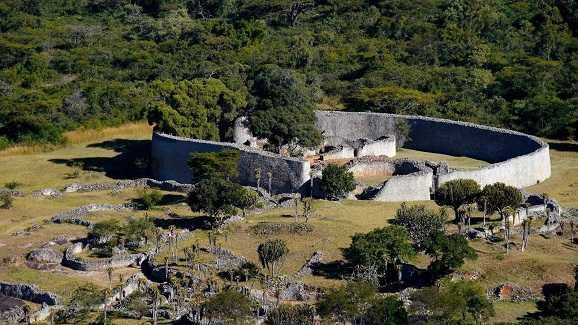Discovered in 1868, the ruins of Great Zimbabwe are a striking testimony of the power of the Bantu civilization at the beginning of the second millennium. It reaches its peak between the 11th and the 15th century, when it has fruitful trading relations with Swahili merchants (we found fragments of China porcelain, Indian jewelry and Persian pottery). The capital was a victim of its success and quickly ran out of natural resources to feed its growing population.
Today, Great Zimbabwe National Monument is the largest archaeological site in sub-Saharan Africa, with its imposing stone walls made of uncemented granite, up to 12 meters high and 6 meters thick.
If African cities are rarely unavoidable, those in Zimbabwe are doing pretty well. Harare, the capital, nicknamed "Sunshine City", is rather pleasant with its vast parks and jacaranda avenues.
The walled city of Great Zimbabwe is a unique testimony of history in southern Africa, as it is well preserved and provides information on this settlement from its origins (in the third century) to its golden age (from the thirteenth to the sixteenth century).
Combining African landscapes, Zimbabwe will seduce you with its diversity. From the splendid Victoria Falls to the unforgettable sunsets of Lake Kariba, from the wild beauty of Mana Pools to the Hwange Park bush, you can experience canoe, motorboat, 4x4 vehicle and walking safaris in search of abundant wildlife. While 13% of its territory is devoted to reserves and other natural parks, it also houses the remains of the largest ancient capital of sub-Saharan Africa, the Great Zimbabwe.
When to go?
Zimbabwe has a tropical climate tempered by altitude, with a rainy season extending from late October to March. As it is located on highlands, it enjoys an average annual temperature of 25 ° C, relatively low compared to its neighbours in Southern Africa.
The country can be visited all year round with more favourable periods depending on interests:
- From May to October (winter): dry season will allow you to see animals as they stay nearby waterhole.
- From November to April, landscapes are green and lush
Formalities:
For French nationals: passport valid at least 6 months after the date of return. An entry visa is required. It can be issued either at the Zimbabwean Embassy in Paris or at points of entry into the territory (Harare and Victoria Falls airports in particular). Provision should be made for the exact amount in banknotes in the event of payment at the airport.
Health:
Anti-malarial treatment is recommended (see your doctor). No vaccinations are required for entry into Zimbabwe. However, it is advisable to check the updating of your usual reminders and vaccinations as for any country.
Other recommended vaccinations (depending on the duration, frequency and hygienic conditions of the stay): diphtheria-tetanus-polio (DTP) including Rubella Mumps and Measles in children; Anti-tuberculosis vaccination and bacterial meningitis A + C + Y + W135.
Currency
The Zimbabwe dollar was the official currency of Zimbabwe from 1980 to 2009. In April 2009, the government decided to leave out, initially for at least one year, the Zimbabwean dollar in favour of foreign currencies. At the beginning of 2015, the Zimbabwean dollar is still not used, in favour of multiple currencies, mainly the US dollar and the South African rand. From 2014, Zimbabwe even hits US dollar coins (only valid in Zimbabwe). Then in November 2016, new Zimbabwe dollar banknotes, indexed to the US dollar, are issued.
Important to know
Travellers' attention is drawn to liquidity issues:
- The maximum amount of foreign currency authorized on entry and exit is 1000 euros or 1,000 US dollars (USD) or 20,000 South African rand
- Cash withdrawals are irregular and limited to USD 100 per day and USD 300 per week
- Payment by bank card is not common.
The government put into circulation at the end of November 2016 two-note bonds with a par value of US $ 2 and US $ 5. These tickets are not convertible and it is advisable to spend them on the spot before the end of the stay
